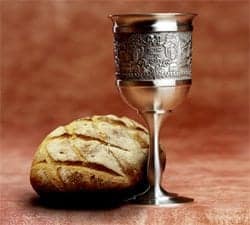When we come to the Table, we are coming to receive a gift. But in order to come rightly, in order to be able to enjoy receiving the gift, we must at the same time be gladly giving a gift. This is the meaning of koinonia fellowship.
In this meal, God gives Himself. He gives Himself in three ways, each corresponding to one of the Persons of the Trinity. First the bread and wine are the gift of the Son. Second, the Father is the giver of this gift—He is the one who determined the gift should be given, and it was His will that the Son was submitting to in the Garden. The decision to give the Son was a decision to give the exact image of Himself. And third, the gift is made possible through the presence and work of the Holy Spirit. He is the one who takes us up, weaves us together, and brings us into the heavenly places in order to partake of the living Christ. So then, God gives us Himself, and as He does so He is holding nothing back.
But to receive the gift we have to be oriented in a particular way. When Scripture tells us that we need to forgive in order to be forgiven, this is not an exhortation to a quid pro quo mentality—if you do x, then God will do y. No, this is stated because a non-forgiving soul cannot hold forgiveness, any more than a bucket with no bottom can hold water. It is the same kind of thing when we talk about receiving the gift of a person and being the gift of a person.
You cannot receive the gift of the Christ without knowing what that is. And you cannot know what that is when your two tight fists are clenching all your own personal prerogatives. Are you worried about the bad things that might come to pass if you give yourself away? Ah, but what might happen if you don’t?
So come, and welcome, to Jesus Christ.


